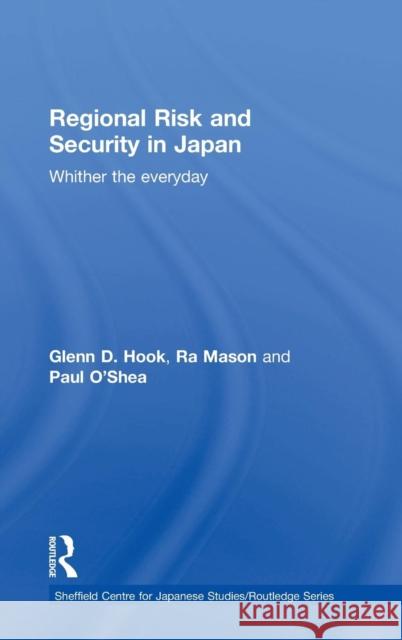Regional Risk and Security in Japan: Whither the everyday » książka
Regional Risk and Security in Japan: Whither the everyday
ISBN-13: 9781138823532 / Angielski / Twarda / 2015 / 238 str.
Regional Risk and Security in Japan: Whither the everyday
ISBN-13: 9781138823532 / Angielski / Twarda / 2015 / 238 str.
(netto: 720,05 VAT: 5%)
Najniższa cena z 30 dni: 654,86
ok. 16-18 dni roboczych.
Darmowa dostawa!
Japan's unusual position in the realm of international politics encapsulates a three-fold juxtaposition: both in and out of Asia, both occupied by and a close ally of the United States, and both a key trade partner and a strategic rival of China. Whilst international relations theory offers a number of ways to analyse these relations, this book instead utilizes the concept of risk to provide an innovative perspective on Japan's relations with China, North Korea and the US. The book elucidates how risk, potential harm and harm are faced disproportionately by certain groups in society. This is demonstrated by providing an empirically rich analysis of the domestic implications of security relations with China, North Korea and the United States through the presence of US troops in Okinawa. Beginning with a theoretical discussion of risk, it goes on to demonstrate how the concept of risk adds value to the study of international relations in three senses. First, the concept helps to break down the boundaries between the international and domestic. Second, the focus on risk and the everyday directs us to ask basic questions about the costs and benefits of a security policy meant to secure the national population. Third, what implications do these two points have for governance? The question is one of governance as Japan's externally oriented security policy produces domestic insecurity shared disproportionately, not equally, as this volume makes clear. Developing the theory of risk as a tool for understanding international relations, this book will be of great interest to students and scholars of Asian politics, Japanese politics, international relations and security studies, as well as to policy makers and practitioners working in the field.











